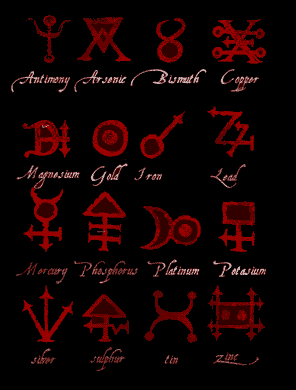It's amazing to me--that whenever the subject of alchemy is brought up--even intelligent, educated, and well-read people resort to the tired old "they tried to turn base metal into gold" line. As if they were "failures" who at least "tried." What a joke! Even someone as well-known as Michio Kaku will cite alchemy as "science's humble beginnings." That's proof that he never bothered to even look into it at all. Career scientists are usually terrified of anything they can't explain or do not understand; which has lead to practices such as hiding away fossils and artifacts from the public into storage because they do not fit their theories of human origins (aka "false theories").
Some excellent quotes from the documentary:
"Magic is both an art and a science. Certain things cause certain affects to happen. At the same time they have to be done with a certain intention and perhaps a certain flair in order to work." -- James Wasserman, Author, 'The Mystery Traditions'
 "Science nowadays really is touching against ideas dealing with where magic and spirituality and religion intersect and they're both ways of trying to find out about how the world works." -- Richard Kaczynski, Ph.D, Author 'Perdurabo: The Life of Aleister Crowley'
"Science nowadays really is touching against ideas dealing with where magic and spirituality and religion intersect and they're both ways of trying to find out about how the world works." -- Richard Kaczynski, Ph.D, Author 'Perdurabo: The Life of Aleister Crowley'"The occult means secret or hidden, and its early masters were regarded as true magicians, but they were also the first scientists. Their discoveries in the occult arts of astrology and alchemy gave birth to modern scientific disciplines. Many still view the occult with suspicion, but modern science is often working on the edge of the supernatural. Trying to solve mysteries that confronted the first magicians. Were the early occult masters keepers of secrets that modern science is only beginning to rediscover?" -- John Cullum, Narrator, 'Secrets of the Occult: The Magicians'
"You go back to ancient times, there was no science. So the magicians and the alchemists and the proto-mathematicians; they were doing science, but they were also doing literature and philosophy and cosmology and religion, and there was no sorting out of those things. Since the birth of what we would call modern science, science and the occult have sort of separated paths. Serious physicists are contemplating time travel. Serious physicists are contemplating parallel universes. Serious physicists are trying to understand the eleven dimensions of string theory, and when you get into those realms, you start to look at myth and sort of magical thinking, and almost surreal thinking as a way to even talk about those things. -- Dan Burstein, Author, 'Secrets of the Code'
"That was really an approach to try and understand the way the physical world works, and alchemy as a practice was the forefather of modern chemistry." -- Richard Kaczynski, Ph.D, Author, 'Perdurabo: The Life of Aliester Crowley'
 "Alchemy had existed since the early Egyptians, but in the hands of the Renaissance scientists it reached new heights. Alchemists were on the leading edge of science. They discovered phosphorus, zinc, the distillation of alcohol, the germ nature of diseases. They were the first to understand how blood circulates in the body. The church viewed their unorthodox experiments and scientific breakthroughs with growing suspicion." -- John Cullum, Narrator, 'Secrets of the Occult: The Magicians'
"Alchemy had existed since the early Egyptians, but in the hands of the Renaissance scientists it reached new heights. Alchemists were on the leading edge of science. They discovered phosphorus, zinc, the distillation of alcohol, the germ nature of diseases. They were the first to understand how blood circulates in the body. The church viewed their unorthodox experiments and scientific breakthroughs with growing suspicion." -- John Cullum, Narrator, 'Secrets of the Occult: The Magicians'"Everything that we know and do today in our modern science was developed by the alchemists. Laboratory techniques were part of the alchemical tradition. The observation of results. The scientific method is a child of alchemy." -- James Wasserman, Author, 'The Mystery Traditions'
.

No comments:
Post a Comment